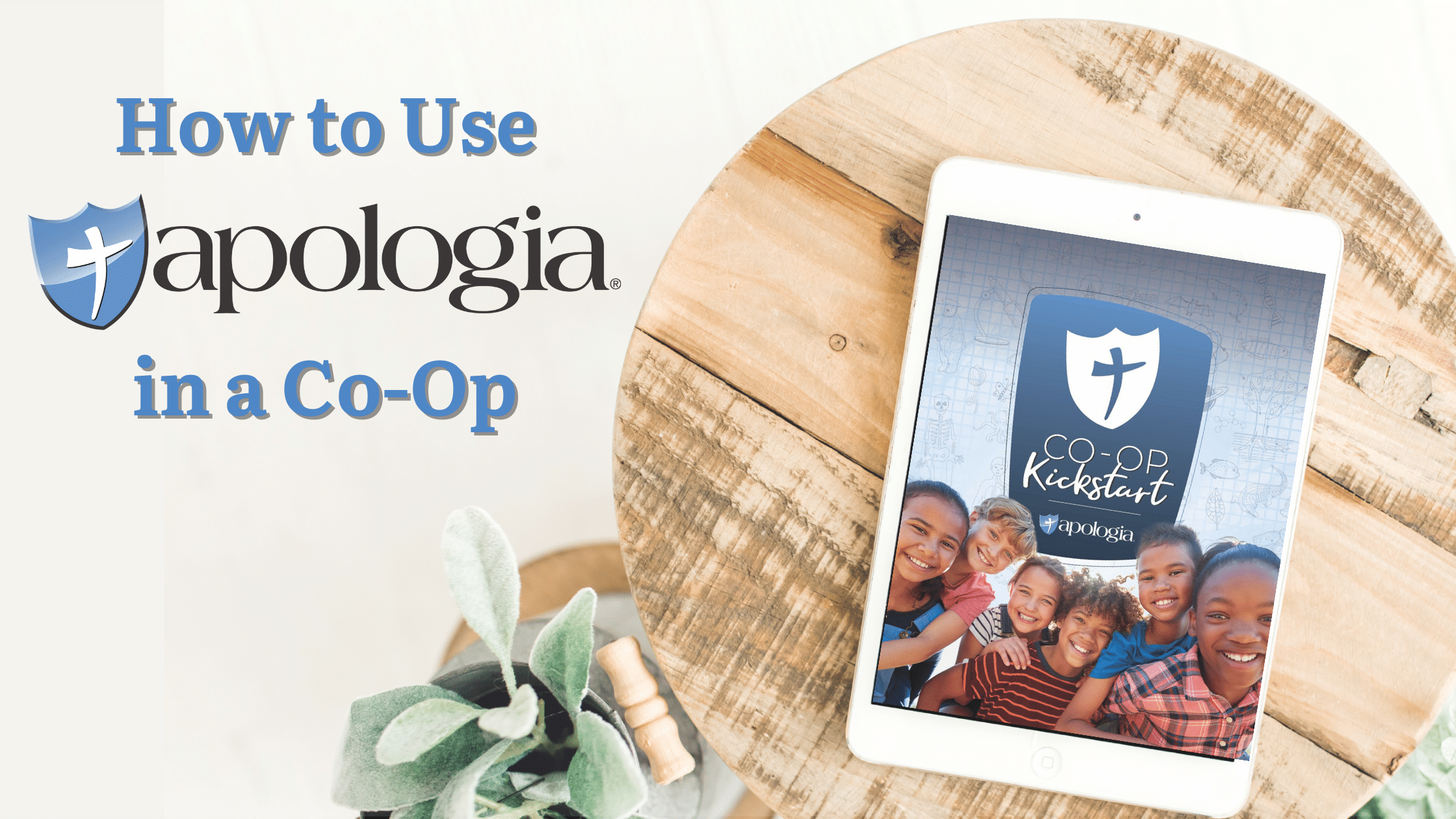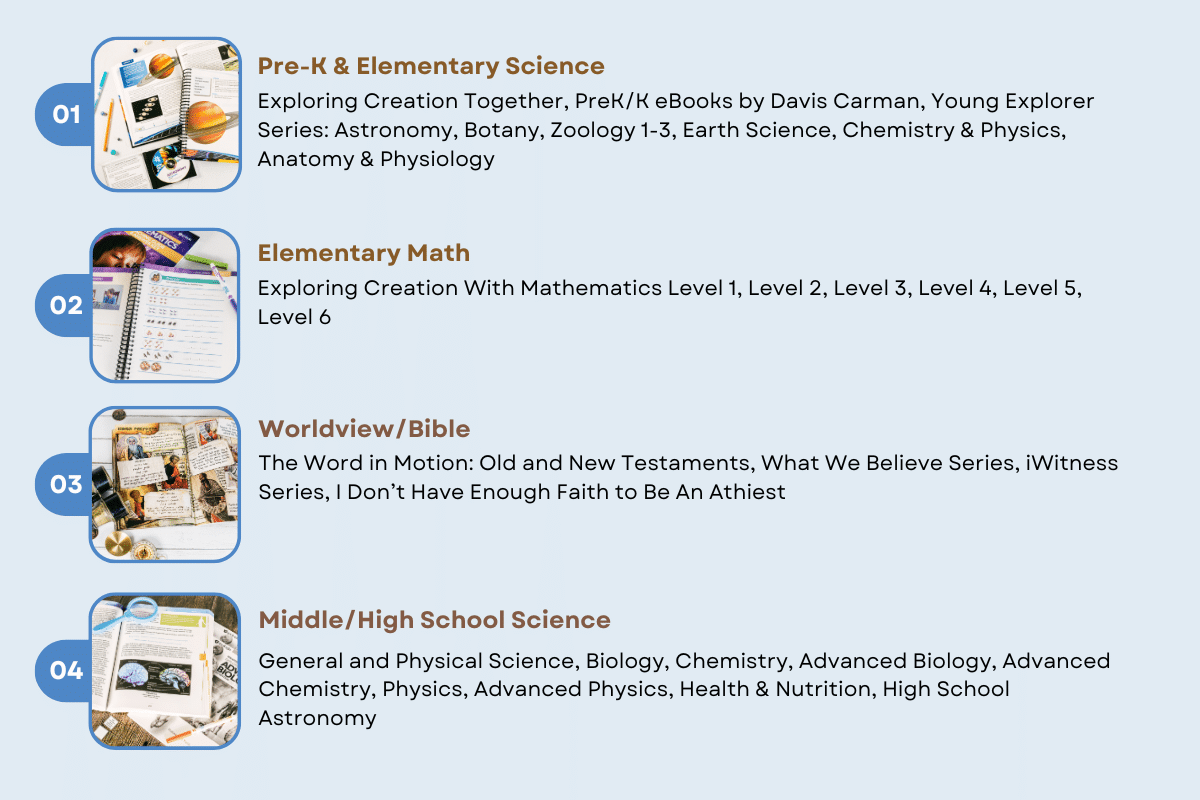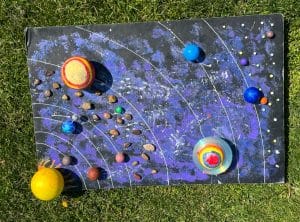
How to Use Apologia in a Co-Op
We at Apoloiga want to support you and your family in your journey to homeschool. One wonderful resource offered to homeschooling families is the ability to get involved in a co-op. If you’re considering teaching at a co-op, the Apologia Co-Op Kickstart Guide is for you. The guide offers suggested schedules, teaching methods, and additional content sources to help you get your students involved in the study of God’s creation and His Word. Let’s take a quick look at the type of content you will find in our FREE downloadable Co-Op Kickstart guide.
Step 1: Choose Your Course Material
Why Choose Apologia for Your Co-Op?
- Award-winning curriculum with a Biblical worldview
- The textbooks are written directly to the student and require very little preparation
- Hands-on activities and experiments throughout the curricula reinforce concepts
- Supply lists are included
- Adaptable to multiple ages and learning styles
- Fosters a lifelong love of learning and experiencing the wonder and awe of Creation and the Creator
Preview & Select the Curriculum
Apologia offers a variety of curricula that would work wonderfully in a co-op setting: science for all grades, elementary math, K-8th bible, and worldview curriculum for all grades.
Selecting the right curriculum can be daunting, especially if you can’t truly flip through the books. So, we offer co-op leaders risk-free purchases. Purchase our curriculum for review; if you decide it’s not the right fit for your homeschool co-op, you can return it within 60 days for only the cost of return shipping. You can also access a digital preview of our curriculum FREE for 30 days.
Step 2: Set Class Expectations
Once you’ve decided on the subject and course material, we recommend setting up your class expectations. This will involve a variety of information, such as what will be covered in your course, how students and parents are expected to participate, handling disciplinary issues, etc. Having your class expectations set up before your first class will set you up for a much smoother year all around. Already knowing how you plan to handle different scenarios provides you with a lot of confidence going into your classroom and gives your students the parameters needed to feel secure in what’s expected of them.
The Co-Op Kickstart guide will help you with everything you need, such as writing a course introduction, creating a syllabus, communicating with parents, and even creating important class policies that cover absences and disciplinary issues. Many co-ops already have information on some of these topics that you can refer to when writing your course expectations, but some may leave it up to the teacher’s discretion, which is where having these things pre-determined will be very helpful.
Step 3: Choose Your Teaching Approach
Picking the teaching method is a really helpful way to start getting organized when planning your class. Here are several options listed in the Co-OP Kickstart guide that complement Apologia’s curricula.
-
Classical
- Students read before class and participate in predetermined activities in class. This method works well with all ages.
-
Socratic
- Students complete assigned reading and notebook activities at home before coming to class. Using their notes, students participate in teacher-led group discussions. Instructors may also use this time to provide additional information on the course topic using outside sources, such as BookExtras. This method works best with older students.
-
Field Trips
- All reading and notebook activities are completed at home. Students in the co-op group meet at various locations to expand upon what they’ve learned in an immersive environment. This method works well for all ages.
- All reading and notebook activities are completed at home. Students in the co-op group meet at various locations to expand upon what they’ve learned in an immersive environment. This method works well for all ages.
-
Journaling
- Students complete the reading and assignment beforehand and work on notebook activities in class.
-
Artistic
- Students come to class having completed all of the coursework at home and use their class time for guided illustrations of course topics. This works great for courses such as Earth Science, where there is a course-long project that students add to as they learn more.
Step 4: Determine Your Class Schedule and/or Weekly Rhythm
All of Apologia’s curricula are designed to be open-and-go for the homeschool family. But how do you adapt the recommended daily schedule, designed for parents and students at home, to fit a classroom? Our FREE Co-Op Guide has several ideas —below are just a few.
Elementary Science Class Plan Sample
- Arrival Activity – Students can color, add images, take notes, complete vocabulary crossword puzzles, and much more.
- Class Connection – Get your students warmed up by preparing a topic and asking students to share science-related stories or experiences
- Previous Lesson Review – Take time to discuss how previous lessons build into the next one.
- This Week’s Lesson – Students should come prepared for class. This means that they should have read the assignment before co-op. Set aside some time to discuss the new materials and answer any questions.
- Activity – Choose from a variety of hands-on activities in our books
Elementary Math Class Plan Sample
- Review of previous lessons
- Questions from the homework
- Preview upcoming concepts
- Complete activities from previous or upcoming lessons that may be more involved
- Complete unit projects
- Work on the problem-solving lessons as a group
- Play games from the current chapter
- Play games from the Unit Skills practice
The Word in Motion Bible Class Weekly Rhythm
Our Bible co-op rhythm runs on a four-day-a-week schedule that starts in a co-op on day one and is completed in the home setting on days two through four. Co-op teachers can even go beyond the spiritual benefits that are received when studying God’s Word. You can incorporate English lessons, foreign language (when you start pulling out the Greek and Hebrew words), history, geography, science, and, yes, even math. Check out this sample four-day week rhythm.
-
Day One – Co-Op
- Discuss the review questions from the previous week’s lessons
- Allow students to recite the previous lesson’s memory verse
- Watch the video for the next lesson
- Practice the motions together
- Introduce the new lesson’s memory verse
-
Day Two – At Home
- Read the narrative in the textbook
- Practice and write the memory verse in the notebooking journal
- Read the sidebar article
- Practice the motions
-
Day Three – At Home
- Read the character sketch and the doctrine articles
- Do the additional activities in the notebooking journal
- Practice the memory verse and the motions
-
Day Four – At Home
- Read the assigned Psalm and Proverb (OT) or Prable or Miracle (NT)
- Read the prayer and pray together
- Discuss/answer the Let’s Talk About It questions in the notebooking journal
- Practice memory verse and the motions
Step 5: Find Additional Content or Activities
Do you need to fill your time with additional content? Or maybe you want to ensure that you appeal to all learning styles? Apologia offers many different resources to assist you in your co-op class.
Online Opportunities
Did you know that each Apologia textbook includes access to a FREE Book Extras webpage packed with incredible bonus content and resources? The curated resource links within Book Extras can save co-op leaders hours of research time by providing additional videos, visual charts, and content to share with students during co-op meetings.
Apologia also offers AutoGrade+, which provides dynamic online testing for Apologia courses with multiple attempts, immediate answer feedback, and automatic grade recording. This can save time for parents and teachers with test scores automatically generated.
Co-Op Science Fair
A science fair is a great way to engage students in your co-op in their science courses and bring students from other classes together! Science fairs allow your students to take the information they are learning and bring it to life with real-life applications on a topic that interests them. They can also do this as a part of Apologia’s annual Science Fair!
Apologia would be honored to be chosen as a curriculum in your co-op. Working together, we can help you have the joy and honor of providing a learning environment for students that helps them become rooted and firmly established in faith by recognizing God’s signature throughout all of creation. You, your students, and your co-op are always in Apologia’s prayers. May your journey be blessed!




